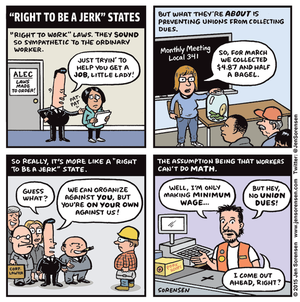Difference between revisions of "Misnomers/right to work"
(Wikipedia; note about non-compete clauses) |
(expanded) |
||
| Line 1: | Line 1: | ||
[[category:orwellianisms]] | [[category:orwellianisms]] | ||
[[File:Righttowork720.png|thumb|Wages in states without RtW laws have higher overall wages than states without, and the difference is generally more than the cost of union dues.]] | [[File:Righttowork720.png|thumb|Wages in states without RtW laws have higher overall wages than states without, and the difference is generally more than the cost of union dues.]] | ||
| − | The phrase "right to work" (RtW) | + | The phrase "right to work" (RtW) generally refers to anti-union laws (aka "right-to-work laws"). They are popular with [[marketist]]s and other right-wingers. |
| + | ==Aliases== | ||
| + | * the right to be screwed | ||
| + | ==Implicit Claim== | ||
| + | The implicit claim is that such laws give you ''more'' [[rights]] rather than ''taking away'' your rights. Proponents argue that they give you the right to work without union interference, without having to pay union dues, and without having to "associate" oneself with a union (which they argue is a violation of the right of {{l/sub|association}}). | ||
| + | ==Reality== | ||
| + | An actual "right to work" would be something more along the lines of an ''employment guarantee'' – a right for any job-seeker to be given a job, preferably at a living wage or higher. | ||
| + | |||
| + | What RtW laws actually do is remove protection and negotiating power from the workers, with the implication that this gives the workers a new "right" because now they're free to work without it. | ||
This is the same kind of logic which argues that people aren't free unless they are [[freedom to become enslaved|"free" to sell themselves into slavery]]. | This is the same kind of logic which argues that people aren't free unless they are [[freedom to become enslaved|"free" to sell themselves into slavery]]. | ||
| − | + | ||
| + | The same logic could be used, for instance, to argue against workplace safety laws -- since the removal of such laws would probably result in more jobs, giving individuals the "freedom" to choose to risk their life or health in an unsafe workplace. In the current climate of job scarcity, many people would feel [[economic coercion|economically compelled]] to take such jobs despite ''not'' really wanting to take them. The idea that the removal of such restrictions bestows any sort of "freedom" or "right" is therefore ludicrous. | ||
==Notes== | ==Notes== | ||
Someone said that right-to-work laws have the advantage (from the worker's POV) that they also ban {{l/wp|non-compete clause}}s, but this does not seem to be true; the only RtW states that also restrict non-compete clauses are Florida (very little restriction) and Texas. | Someone said that right-to-work laws have the advantage (from the worker's POV) that they also ban {{l/wp|non-compete clause}}s, but this does not seem to be true; the only RtW states that also restrict non-compete clauses are Florida (very little restriction) and Texas. | ||
Revision as of 15:47, 4 April 2015
The phrase "right to work" (RtW) generally refers to anti-union laws (aka "right-to-work laws"). They are popular with marketists and other right-wingers.
Aliases
- the right to be screwed
Implicit Claim
The implicit claim is that such laws give you more rights rather than taking away your rights. Proponents argue that they give you the right to work without union interference, without having to pay union dues, and without having to "associate" oneself with a union (which they argue is a violation of the right of association).
Reality
An actual "right to work" would be something more along the lines of an employment guarantee – a right for any job-seeker to be given a job, preferably at a living wage or higher.
What RtW laws actually do is remove protection and negotiating power from the workers, with the implication that this gives the workers a new "right" because now they're free to work without it.
This is the same kind of logic which argues that people aren't free unless they are "free" to sell themselves into slavery.
The same logic could be used, for instance, to argue against workplace safety laws -- since the removal of such laws would probably result in more jobs, giving individuals the "freedom" to choose to risk their life or health in an unsafe workplace. In the current climate of job scarcity, many people would feel economically compelled to take such jobs despite not really wanting to take them. The idea that the removal of such restrictions bestows any sort of "freedom" or "right" is therefore ludicrous.
Notes
Someone said that right-to-work laws have the advantage (from the worker's POV) that they also ban non-compete clauses, but this does not seem to be true; the only RtW states that also restrict non-compete clauses are Florida (very little restriction) and Texas.
